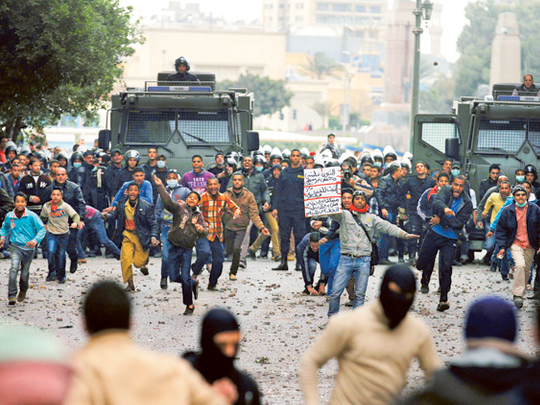
Cairo: Eight months after transferring power to Egypt’s first democratically elected president, the army is being urged by the secular-minded opposition to help end a political deadlock deepened by deadly violence.
In a dramatic U-turn, Mohammad Al Baradei, the leader of Egypt’s main opposition bloc, on Wednesday called for “immediate talks” with the Islamist President Mohammad Mursi, saying the meeting should be attended by ministers of defence and the interior as well as the ruling Islamists.
“Halting violence is the priority along with initiating a serious dialogue based on guarantees demanded by the National Salvation Front,” Al Baradei wrote in a tweet.
The Front, a grouping of leftists and liberals led by Al Baradei, has demanded Mursi form a national unity government to replace an Islamist-led cabinet, and to create a committee of legal experts to amend a recently approved constitution, which the opposition says undermines fundamental rights.
Al Baradei’s bloc had earlier in the week spurned a call by Mursi to attend “national dialogue” talks after days of violence that claimed more than 50 lives across Egypt.
The crisis has been one of the toughest since Mursi took office in June and prompted Defence Minister Abdul Fattah Al Sissi to warn that the political dispute could result in the “collapse of the state”.
The Muslim Brotherhood, from which Mursi hails, has yet to spell out an official position on Al Baradei’s proposal.
Yet, Essam Al Erian, a senior official in the powerful group, wrote on his Facebook account: “The Egyptian army belongs to the people. The army will not return to a recent situation, which... caused harm to its personnel and commanders.”
Al Erian was referring to a 16-month turbulent transitional period run by the military after the former strongman Hosni Mubarak was toppled in a popular revolt almost two years ago.
Nearly two months after taking power, Mursi sacked the ex-ruling generals and replaced them.
Mursi was visiting Germany on Wednesday when Al Baradei went public with his proposal. However, the independent newspaper Al Shorouk quoted what it called a senior presidential source as describing Al Baradei’s call as “incomprehensible”.
“It contradicts repeated statements by the defence minister that the army undertakes its national duties, away from politics.”
The army dominated power in Egypt for six decades, with all Mursi’s predecessors having a military background.
The upper house of parliament, Egypt’s interim legislature, this week approved a bill putting the army in charge of securing state institutions and arresting vandals after several public buildings had been torched in anti-government violence.
“The army remains an effective institution in preventing the state from crumbling,” said Ahmad Sarhan, a military expert. “It may be the only institution still capable of doing this in view of the police’s weakness,” he told Gulf News.
“Moreover, the army is now responsible for protecting vital institutions across the country and is in direct contact with the people. So, it is natural that it [the military] participates in any dialogue aimed to stop the country from falling into chaos,” he added.
In December, an announced bid by the army to defuse a crisis between Mursi and the opposition was abruptly dropped, with the military saying it did not generate the “expected response.”
At the time, the opposition claimed the bid had been aborted by Mursi and the Muslim Brotherhood.












